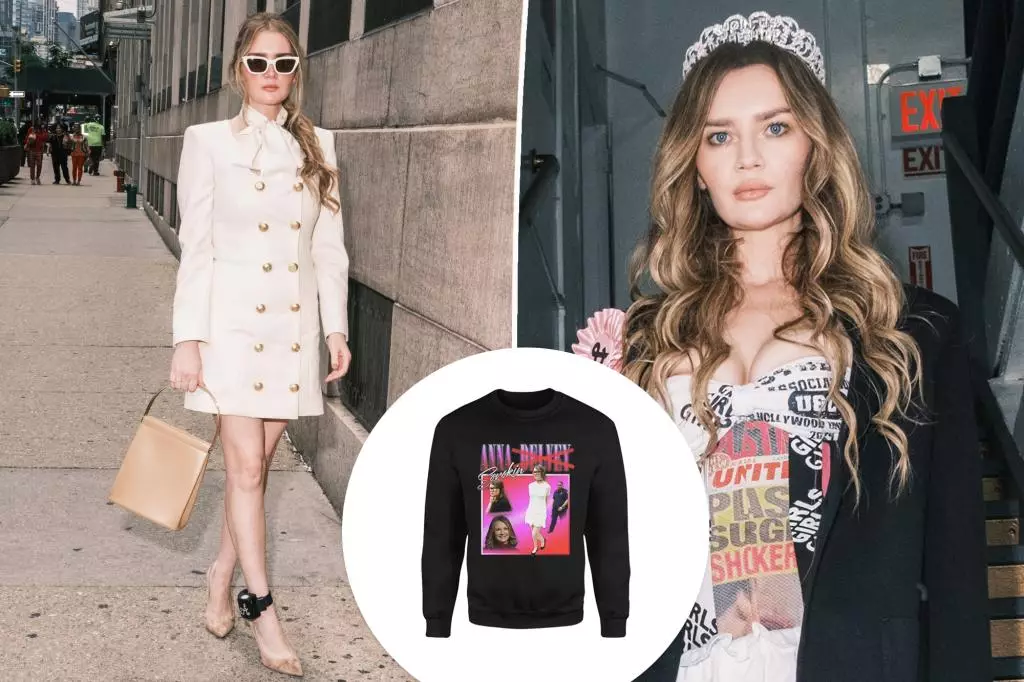Anna Sorokin, known infamously as Anna Delvey, has become a polarizing figure in contemporary celebrity culture. Across the last few years, her story has navigated through crime, deception, and eventual reinvention, but one aspect of her current narrative stands out: her fierce protection of her brand as she capitalizes on her infamous past. Recently, Delvey embarked on a legal journey against retail giant Walmart, which has raised important questions about intellectual property rights and the boundaries of commercialism.
Delvey’s past as a self-styled “fake heiress” is well-documented; between 2013 and 2017, she scammed various businesses and individuals out of surmounting amounts of money, claiming to belong to high society. After serving time in prison for her crimes, Delvey emerged with an ambition to remake herself within the fashion industry. The mystique surrounding her name, along with the recent popular media portrayals, allowed her to cultivate a unique position within the fashion landscape—one that she has consciously trademarked for her personal brand.
Strategically, the establishment of “Anna Delvey LLC” and the acquisition of her trademark was timed perfectly with her release from prison, signaling her intent to control her narrative post-incarceration. In September 2022, just before leaving prison, she successfully registered her brand, which would cover a wide range of apparel. This foundational step illustrates a calculated maneuver that has placed Delvey not only back in the public eye but also firmly in the realm of commerce.
The crux of her recent legal maneuvers revolves around Walmart, which began selling T-shirts and sweaters emblazoned with her name and likeness. Learning that her trademark was being infringed upon, Delvey promptly dispatched a cease-and-desist letter through her attorney, Duncan Levin. The claim rests on the assertion that Walmart’s use of her name constitutes flagrant theft of her federally registered trademark, potentially diluting her hard-won brand.
Levin’s description of Walmart’s actions as “egregious” resonates deeply in the context of modern consumer culture, where branding and identity are often conflated. The implications of such a legal clash extend far beyond personal injury for Delvey; they also underscore the vital importance of intellectual property rights in an age where information travels rapidly and brands proliferate.
The Walmart case has wider repercussions for how current and future trademark law may be interpreted in cases related to contentious figures or brands that have emerged from illicit contexts. As Delvey demands an immediate and comprehensive accounting of all sales data relating to these offending items, she is asserting her rights in a manner that aligns with corporate strategies—ironically mirroring the very systems she once sought to manipulate through deception.
The public response to Delvey’s actions is as multifaceted as her own story. There is an undeniable fascination with her audacity and flair for reinvention, yet it coexists with a palpable skepticism about the legitimacy of her claims. As her narrative unfolds, it invites discourse on the nature of crime, punishment, and redemption. Once vilified as a con artist, she now positions herself as an entrepreneur navigating the complexities of fame.
Moreover, her endeavors have alarmingly overlapped with a culture that often celebrates controversial figures, creating a dichotomy between admiration for her tenacity and condemnation of her past. The media’s portrayal of her as a savvy businesswoman raises ethical questions: can criminality and fashion identity be reconciled?
As Anna Sorokin, aka Anna Delvey, traverses the intersection between notoriety and entrepreneurial ambition, her ongoing legal battles encapsulate the transactional nature of her reinvention. Whether she ultimately prevails against Walmart remains to be seen, but what is clear is that Sorokin has adeptly tapped into a vein of cultural dialogue about identity, morality, and the commercialization of infamy. In the world of fashion and beyond, the definition of a “career”—particularly one built on deception—will undoubtedly continue to provoke discussion for years to come.
